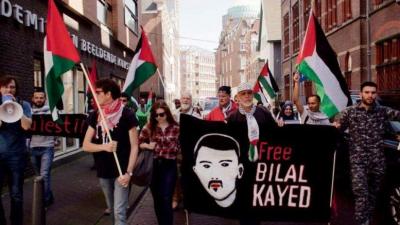
Palestinian and Israeli NGO's Concerned by Recent Court Decision regarding Bilal Kayed
On the 11th of August, the Beer Sheva District Court rejected the appeal of Bilal Kayed, who is completing 64 days of hunger strike in protest of his administrative detention, and whose condition is considered critical. The court ruled that he shall remain shackled to his hospital bed by his hand and leg, and shall not be granted a visit by an external independent physician, using arguments that create a dangerous precedent contrary to the Patients’ Rights Law and prisoners’ rights. Today, Physicians for Human Rights Israel (PHRI) has submitted an appeal to the Supreme Court. An appeal hearing has been scheduled by the Supreme Court to the 22nd of August 2016 in response to an appeal submitted by Addameer’s lawyer to cancel Mr. Kayed’s administrative detention.
The District Court judge, AharonMishnayot, ruled that Mr. Kayed must remain shackled and appeared convinced by the claims of the Israeli Prison Service (IPS) that Mr. Kayed would be abducted from the hospital by some entity and that he poses a clear and concrete threat to state security. The claims were based on secret IPS intelligence that PHRI’s attorney was denied the right to review during the court hearing. This, despite Mr. Kayed’s conduct during his 14.5 years in prison, during which time he was not violent neither to prison staff nor fellow prisoners. Moreover, this decision is in total contradiction to Mr. Kayed’s deteriorating medical state - including pain in the chest, kidney, jaw, eyes, blurred vision, numbness throughout the body, hair loss, yellowness, peeling of the skin, and grave risk of stroke. Nevertheless, Mr. Kayed has reported to Addameer’s attorney on the 8th of August that the Director of Ashkelon Prison (who reportedly visited Kayed on the 6th of August) has stated that he held him responsible for the mass hunger strikes inside the prisons. The continued shackling of a patient in these circumstances violates medical ethics, international medical guidelines and the right of freedom from torture and/or cruel, inhuman or degrading treatment.
Moreover, the Court ruled that an independent doctor’s visit was not necessary, as Mr. Kayed was already visited by a physician from the International Committee of the Red Cross - Israel. Yet ICRC-Israel visits focus on ensuring that a prisoner is held in accordance with international standards and are no substitute for a second opinion. In using this argument, the court has used the humanitarian activities of ICRC-Israel as an excuse to further violate fundamental human rights. International ethical codes emphasize the importance of a medical examination by an independent doctor to create a trusting relationship with the hunger striker in an attempt to reach a life-saving solution. As Mr. Kayed is now in the 64th day of his hunger strike, this delay can be critical.
The Court also wrote that PHRI’s petition “wasn’t motivated by a genuine concern for the petitioner’s health, but a hidden agenda”. This smear of PHRI is highly problematic and is clearly aimed at undermining their work and credibility. This is carried out against a backdrop of repeated attempts to undermine the legitimacy and efforts of all those organisations and individuals fighting against the occupation.
Meanwhile, in a recent request by PHRI on behalf of Mr. Kayed to have access to his medical records, the Director of the Barzilay Hospital responded that PHRI must go through the IPS. This is in clear contradiction to section 18 A of the Patients’ Rights Law, which highlights the patients’ rights to secure their medical records.
This recent court decision and the delays in the court system are yet more infringements on the right of hunger strikers and points to the political considerations at play, including the attempt to break the hunger strikers’ morale. Hunger striking is a non-violent form of protest, and often the only recourse for prisoners to draw attention to Israel’s abusive detention policies.
In its 2016 concluding observations, the UN Committee Against Torture noted that “The Committee is concerned at allegations of instances in which prisoners who engaged in hunger strikes were punished or subjected to ill-treatment” (para. 26) and recommended that Israel, “urgently take the measures necessary to end the practice of administrative detention and ensure that all persons who are currently held in administrative detention are afforded all basic legal safeguards” (para. 23).
We call on the international community to urge Israel to enable an independent doctors’ visit, release Bilal Kayed immediately, end the harsh, inhuman and degrading practices that pressure hunger strikers to end their strikes and review the continuous and systematic human rights violations of Palestinian prisoners and detainees, especially in regards to the policy of administrative detention.
Signing organizations: Adalah - The Legal Center for Arab Minority Rights in Israel, Addameer Prisoner Support and Human Rights Association, The Public Committee against Torture in Israel (PCATI) and Physicians for Human Rights-Israel (PHRI)